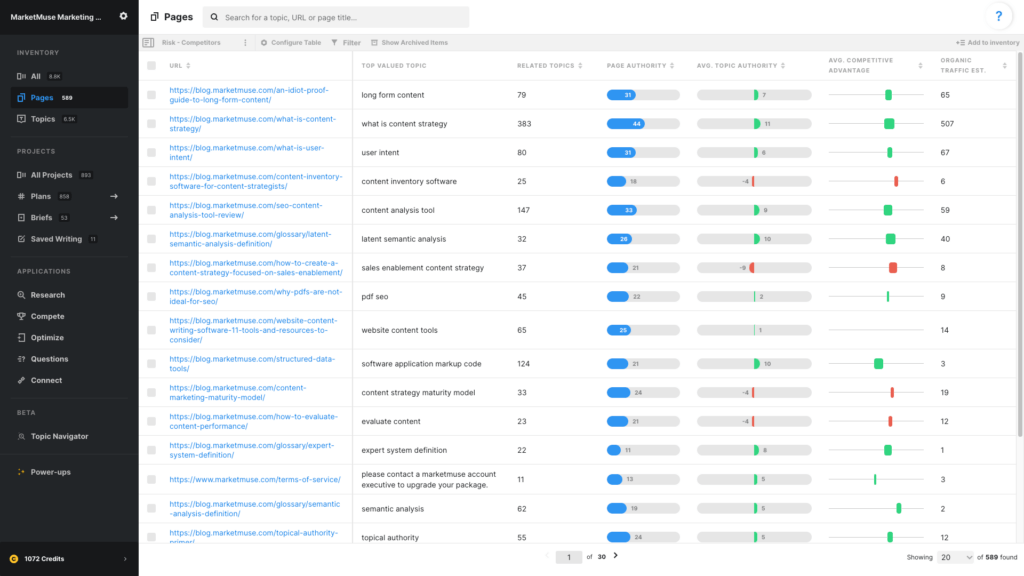
In this article, we are looking at pages that are at risk from competitors. First, let’s set up a view for this in the Pages Inventory.
Use these data points
- URL
- Top Valued Topic
- Related Topics
- Page Authority
- Avg. Topic Authority
- Avg. Competitive Advantage
- Organic Traffic Est.
URL and Top Valued Topic help to recognize what the page is about.
Related Topics is the number of topics associated with this page, both ranking and non-ranking.
Page Authority is a combined measurement of traffic and ranking and is calculated relative to other pages on your domain. Pages with high Page Authority are those that get a great deal of traffic and rank for many topics.
Avg. Topic Authority averages the topical authority of all the ranking topics for that page. Topic authority is a measurement of how well your site performs for a specific topic.
Avg. Competitive Advantage. Competitive Advantage is a metric that applies to individual topics. At the page level it is averaged since one page can rank for many topics. Competitive Advantage is the difference between Difficulty (how hard it is for anyone to rank for a topic) and Personalized Difficulty (how hard it is for you to rank for a topic). It’s presented as a horizontal candlestick:
- A green bar indicates a positive Competitive Advantage. It’s easier for you because Personalized Difficulty is less than Difficulty.
- A red bar indicates a negative Competitive Advantage. It’s harder for you because Personalized Difficulty is greater than Difficulty.
- The length of the bar illustrates how great your Competitive Advantage is (a long green bar is best).
- Where the bar sits on the line is based on the Difficulty and Personalized Difficulty. The line starts at 0 on the far left and finishes at 100 on the right.
Organic Traffic Estimate is an estimate of the amount of traffic this page currently receives. MarketMuse estimates the traffic for each topic for which a page ranks, taking into account its position in the search results and any SERP features as they impact click-through rates. The results are then summed to create the traffic estimate for the page.
Sort by
- Related Topics descending (highest to lowest)
Using this view
Sorting by Related Topic descending helps to quickly identify important pages since pages that rank for many topics usually have some degree of value.
Finding Pages at Risk
By comparing Page Authority with Topic Authority you can find pages that are potentially at risk. A strong page (high Page Authority) with low Topic Authority means that a competitor could potentially create a bigger cluster around the subject and gain more authority.
Investigating Pages of Interest
You can drill further down to investigate pages of interest and determine how they’re generating traffic. You can see the terms for which a page ranks, and sort by a number of metrics depending on your objective. In this way you discover how best to update a page through additional topics or improving coverage of existing ranking topics. Alternatively, you may decide to build out a cluster by devoting new pages to related topics.
Customizing this view
Here are a few ideas for customizing this view:
- Apply a filter to Related Topics to limit the list to pages that rank for many topics.
- Apply a filter to Organic Traffic Est. to create a shortlist based on the traffic generated by a page.
- Sort by Organic Traffic Est. if you’ve applied a filter to create a shortlist.
- Apply a filter to Avg. Competitive Advantage to shorten the list based on you competitive advantage (-100 to 100 with a higher positive value being better). Although displayed as a graph, you can filter numerically on this metric.
Remember you can apply filters individually or in combination with others.
